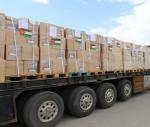You are here
For Arab American voters, Gaza looms large
Oct 08,2024 - Last updated at Oct 08,2024
For Arab Americans, Israel’s war on Palestinians in Gaza looms large and will play a significant role in this November’s election. This key observation emerges from a mid-September nationwide poll of 500 Arab American registered voters conducted by John Zogby Strategies for the Arab American Institute.
This devastating year-long assault on Gaza has reshaped the Arab American electorate, souring attitudes towards the Democratic Party, sapping enthusiasm to vote, and negatively impacting inclinations to vote for Vice President Kamala Harris.
For our three decades of polling Arab Americans, the community has consistently favored Democrats, with a steady 2:1 margin of support for years. The Biden administration’s handling of the crisis in Gaza, however, has eroded that support, with Arab Americans now evenly divided between the two parties—38.5 per cent for each. And by a slight margin (46 per cent to 44 per cent), voters in the community would prefer Republicans control the next Congress.
Arab American voter turnout has consistently been around 80 per cent. But this year only 63 per cent say they are enthusiastic about voting in November, likely impacting turnout.
It is all taken a toll on Harris’ prospects for winning Arab American votes in her contest with former President Donald Trump. While Biden won 59 per cent of the Arab American vote in 2020, versus 35 per cent for Trump, this year’s poll shows a virtual dead heat around 41-42 per cent in a multi-candidate matchup. More ominous for Harris is that among likely voters, Trump leads 46 per cent to 42 per cent.
While a few unscientific “polls” have suggested that a third-party candidate would garner a majority of the Arab American vote, this AAI poll finds that all third-party candidates combined receive just 12 per cent of the community’s vote. Instead, Trump is the beneficiary of the community’s anger over the Biden administration’s failure in addressing the crisis in Gaza.
It is perhaps surprising given Trump’s record and recent statements, but a few factors may account for it. There may be a desire to punish Democrats for the year-long trauma. Additionally, despite Trump’s dismal record on the Israeli-Palestinian conflict and support for Israel’s war aims, the AAI poll shows that sub-groups previously aligned with the Republican Party are returning to the fold.
Further, 81 per cent of Arab Americans say that Gaza will be an important consideration in their vote. When asked if Harris were either to demand an immediate ceasefire and unimpeded humanitarian aid to Palestinians in Gaza or to withhold diplomatic support for and arms aid to Israel until a ceasefire and withdrawal of its forces from Gaza, Arab American support for Harris would increase to around 62 per cent. This new Harris tally captures one-third of Trump voters, while virtually wiping out votes for third-party candidates. If Trump were to make the same demands on Israel, he too would benefit increasing his vote tally to 56 per cent, with the increase coming from one-quarter of Harris voters and one-half of third-party candidate votes.
While these measures are needed and important to end the war, announcing such a policy change during a campaign might be considered a heavy lift. Other less dramatic steps could have helped win more Arab American support. For example, Harris lost an important opportunity by refusing to include a Palestinian American with family in Gaza as a Democratic convention speaker. When asked if such an invitation would have made a difference in how they would vote, the response was a substantial “yes”. Harris’ vote tally from Arab Americans would have increased to 61 per cent. That moment was squandered, but should others arise, and Harris still wants Arab American support, these opportunities shouldn’t be passed over.
In 30 years of polling Arab American voters, we have not witnessed anything like the role that the war on Gaza is having on voter behavior. The year-long unfolding genocide in Gaza and the catastrophe now facing Lebanon has impacted every component sub-group within the community, with only slight variations among religious communities and countries of origin, immigrant or native-born, gender and age groups. With the election approaching, Arab Americans and, as our polls of US voters have shown, those who share their concerns (young and non-white voters) will be watching to see if their deeply felt concerns with Gaza and now Lebanon will be recognised and respected with a promise for change.
The writer is president of the Washington-based Arab American Institute














Add new comment